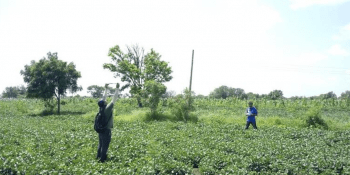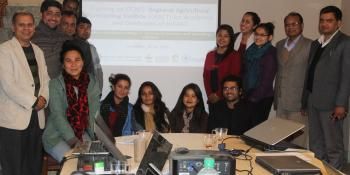Scaling-up Strategies for Climate Risk Management in South Asian Agriculture
This project aims to increase farmers' access to climate-smart agriculture solutions by translating science-based evidence, enhanced capacity and innovative partnerships with regional, national and sub-national stakeholders in South Asia. To achieve this goal, the project focuses on evaluation and synthesis of CSA evidence across different agro-ecological systems and institutional mechanism of scaling out CSA innovations. These activities would contribute towards a national strategy for synthesizing existing and new knowledge and learnings gained by NARS and CG centres Programs in climate risk management to guide investments being made by the government and donors.
This project also focuses on developing climate-smart finance and investment plan at national and/or sub-national levels for scaling out CSA. These plans will lead to developing climate finance strategies in agriculture sectors through various financing sources and investment mechanisms. The CSA options are also exploring residue management using alternate tillage practices and straw management system to curb rice residue burning and resultant air pollution in north-western India. Additionally, this project focuses on assessing the links between CSA, Insurance, reinsurance and social welfare in climatically challenged areas using state-of-art tools and technologies to strengthen climatic risk management in the region.
Knowledge sharing and capacity development are integrated in this project; it provides a platform for South-South collaboration through capacity development, sharing science-based evidence on CSA and cross-CRP linkages. Raising the capacity of women and youth for climate risk management in agriculture are a critical part of the project for scaling out CSA practices, technologies, services and CSV approach.
Project Deliverables
Discussion paper/Working paper/White paper
Synthesis of CSV approach implemented in the different agro-ecological regions of SA
Discussion paper/Working paper/White paper
Synthesis of gender and social inclusions in scaling out CSA
Discussion paper/Working paper/White paper
Improved agriculture insurance products and schemes for climate risk management
Research workshop report
In-season crop yield forecast
Journal Article (peer reviewed)
Global wheat production with 1.5 and 2.0°C above pre‐industrial warming
Journal Article (peer reviewed)
The Hot Serial Cereal Experiment for modeling wheat response to temperature: field experiments and AgMIP-Wheat multi-model simulations
Funder report
Development of portfolios of climate smart interventions based on farming systems in key agro-ecological zones of ITC’s project area
Data portal/Tool/Model code/Computer software
Development of ICT based decision support system
Discussion paper/Working paper/White paper
Inseason crop yield forecasting for early warning planning of food security using CCAFS Regional Agricultural Forecasting Toolbox (CRAFT) in Nepal
Funder report
Improved package of CSA practices and technologies practiced by thousands of farmers in Maharashtra
Journal Article (peer reviewed)
Multi-objective land use allocation modelling for prioritizing climate-smart agricultural interventions
Discussion paper/Working paper/White paper
Lessons on bridging the science-policy divide for climate change action in developing countries
Funder report
Improved ICT advisories to farmers of Maharashtra
Journal Article (peer reviewed)
Facilitating Change for Climate-Smart Agriculture through Science-Policy Engagement
Brochure
Towards climate-smart agricultural policies and investments in Telangana
Infographic
Establishment of CSVs in 75 clusters of villages in 3 states of India covering 10,000 direct beneficiaries and 30,000 indirect beneficiaries
Journal Article (peer reviewed)
Analyzing the role of agriculture in nationally determined contributions to the Paris agreement
Brochure
Developing Resilient Agriculture to Climate Change in India
Lecture/Training Course Material
Capacity building of partner organizations to transfer CSV/CSA knowledge and technologies to local farmers and communities in climate change adaptation
Journal Article (peer reviewed)
Woman in agriculture, and climate risks: hotspots for development
Policy brief/policy note/briefing paper
Integrating Gender into the Climate-Smart Village Approach of Scaling out Adaptation Options in Agriculture
Policy workshop/Dialogue report
CGIAR and Industry CSR conclave for greater uptake of CCAFS's research and funding
Data portal/Tool/Model code/Computer software
Improved weather indices for key crops disaggregated by region
Journal Article (peer reviewed)
How much does climate change add to the challenge of feeding the planet this century?
Policy workshop/Dialogue report
Climate-smart agriculture as an investment destination for CSR
Discussion paper/Working paper/White paper
Gender and CSA impact assessment in CSVs
Journal Article (peer reviewed)
Vertical drains to minimize duration of seasonal waterlogging in Eastern Ganges Basin flood plains: a field experiment
Policy workshop/Dialogue report
South:South Collaboration on Climate Risk Management
Journal Article (peer reviewed)
Challenges and Responses to Ongoing and Projected Climate Change for Dryland Cereal Production Systems throughout the World
Policy brief/policy note/briefing paper
Solar irrigation pumps and India’s energy-irrigation nexus
Journal Article (peer reviewed)
Unfolding government policies towards the development of climate smart agriculture in India
Journal Article (peer reviewed)
Solar pumps and South Asia’s energy-groundwater nexus: exploring implications and reimagining its future
Journal Article (peer reviewed)
The climate-smart village approach: framework of an integrative strategy for scaling up adaptation options in agriculture
Journal Article (peer reviewed)
Adoption of multiple climate-smart agricultural practices in the Gangetic plains of Bihar, India
Journal Article (peer reviewed)
Cost-effective opportunities for climate change mitigation in Indian agriculture
Journal Article (peer reviewed)
Climate change impact and adaptation for wheat protein
Journal Article (peer reviewed)
Multimodel ensembles improve predictions of crop–environment–management interactions
Journal Article (peer reviewed)
How much does climate change add to the challenge of feeding the planet this century?
Special issue
Profiling Climate Smart Agriculture for Southern Coastal Region of Bangladesh and its Impact on Productivity, Adaptation and Mitigation
Journal Article (peer reviewed)
Importance of considering technology growth in impact assessments of climate change on agriculture
Journal Article (peer reviewed)
Climate change mitigation options among farmers in South Asia
Journal Article (peer reviewed)
Soil hydraulic response to conservation agriculture under irrigated intensive cereal-based cropping systems in a semiarid climate
Journal Article (peer reviewed)
Climate change impact and adaptation for wheat protein
Journal Article (peer reviewed)
Soil biological properties and fungal diversity under conservation agriculture in Indo-Gangetic Plains of India
Journal Article (peer reviewed)
Conservation agriculture based sustainable intensification of basmati rice-wheat system in North-West India
Journal Article (peer reviewed)
Climate change and agriculture in South Asia: adaptation options in smallholder production systems
Journal Article (peer reviewed)
Effect of different tillage and residue management practices on crop and water productivity and economics in maize (Zea mays) based rotations
Journal Article (peer reviewed)
Business models of SMEs as a mechanism for scaling climate smart technologies: The case of Punjab, India
Journal Article (peer reviewed)
Ten years of conservation agriculture in a rice–maize rotation of Eastern Gangetic Plains of India: Yield trends, water productivity and economic profitability
Journal Article (peer reviewed)
Assessing climate adaptation options for cereal-based systems in the eastern Indo-Gangetic Plains, South Asia
Journal Article (peer reviewed)
Dependence of temperature sensitivity of soil organic carbon decomposition on nutrient management options under conservation agriculture in a sub-tropical Inceptisol
Policy brief/policy note/briefing paper
Scaling-Up Climate Smart Agricultural Technologies and Approaches Using Travelling Seminar as a Method and Tool in Nepal
Journal Article (peer reviewed)
Unfolding government policies towards the development of climate smart agriculture in India
Discussion paper/Working paper/White paper
A compendium of Technologies, Practices, Services and Policies for Scaling Climate Smart Agriculture in Odisha (India)
Journal Article (peer reviewed)
Prioritizing Land and Water Interventions for Climate-Smart Villages
Journal Article (peer reviewed)
Spatial targeting of ICT-based weather and agro-advisory services for climate risk management in agriculture
User manual/Technical Guide
Building Capacities for Scaling-Up Climate Smart Village: A training manual
Research workshop report
Learning and action for gender-transformative climate-smart agriculture
Journal Article (peer reviewed)
Assessing climate adaptation options for cereal-based systems in the eastern Indo-Gangetic plains, South Asia
Journal Article (peer reviewed)
Fields on fire: Alternatives to crop residue burning in India
Research workshop report
Scaling Climate-Smart Agriculture in Bangladesh: Practices, Policies and Institutions
Journal Article (peer reviewed)
Potential of climate-smart agriculture in reducing women farmers’ drudgery in high climatic risk areas
Discussion paper/Working paper/White paper
A compendium of piloted solar irrigation projects in India
Brochure
CCAFS-in the South Asian Region
Journal Article (peer reviewed)
Stakeholders prioritization of climate-smart agriculture interventions: evaluation of a framework
Discussion paper/Working paper/White paper
Scaling Out Climate-Smart Agriculture for Resilient Farming in Adilabad District of Telangana
Research workshop report
Strengthening Climate-Resilient Agricultural Systems in South Asia: CCAFS South Asia Regional Meeting Report
Journal Article (peer reviewed)
A multi-scale and multi-model gridded framework for forecasting crop production, risk analysis, and climate change impact studies.
Presentation/Poster
Summary of Brainstorming Sessions - South-South Knowledge Exchange Workshops on Climate Smart Agriculture Nairobi, Kenya
Research workshop report
Communicating Climate Smart Agriculture to the Stakeholders: Impact of LI-BIRD/CCAFS Travelling Seminars in Climate Smart Villages of Nepal : An Impact Assessment Report
Journal Article (peer reviewed)
Global wheat production with 1.5 and 2.0°c above pre‐industrial warming
Journal Article (peer reviewed)
Re-designing irrigated intensive cereal systems through bundling precision agronomic innovations for transitioning towards agricultural sustainability in North-West India
Research workshop report
South-South Collaboration in CCAFS for Developing Capacity on Weather Index Insurance
Journal Article (peer reviewed)
Designing weather index insurance of crops for the increased satisfaction of farmers, industry and the government
Journal Article (peer reviewed)
Gender Integration in Climate Change and Agricultural Policies: The Case of Nepal
Journal Article (peer reviewed)
Designing profitable, resource use efficient and environmentally sound cereal based systems for the Western Indo-Gangetic plains
Funder report
Scaling up resilient agricultural practices, technologies and services in the vulnerable areas of India
Journal Article (peer reviewed)
Mitigation potential with CSA portfolio
Journal Article (peer reviewed)
Downscaling Regional Crop Yields to Local Scale Using Remote Sensing
Journal Article (peer reviewed)
Using a positive deviance approach to inform farming systems redesign: A case study from Bihar, India
Data portal/Tool/Model code/Computer software
Rice Crop Manager Odisha: A web-based ICT tool for site-specific crop management recommendations
Journal Article (peer reviewed)
Integrated technological solutions (CAM) tool
Journal Article (peer reviewed)
Database and evidences for the adaptive capacity and mitigation potential of CSA practices and technologies
Lecture/Training Course Material
Climate-Smart Agriculture (CSA): Training Manual
Lecture/Training Course Material
Training workshops on CSA technologies and implementation strategies for corporate sector/private sector/public sector organizations
Journal Article (peer reviewed)
Farm-level exploration of economic and environmental impacts of sustainable intensification of rice-wheat cropping systems in the Eastern Indo-Gangetic plains
Journal Article (peer reviewed)
Conservation agriculture for sustainable intensification in South Asia
Discussion paper/Working paper/White paper
A Compendium of Key Climate Smart Agriculture Practices in Intensive Cereal Based Systems of South Asia
Journal Article (peer reviewed)
Agricultural labor, COVID-19, and potential implications for food security and air quality in the breadbasket of India
Partners
- BAIF Development Research Foundation
- Bangladesh Agricultural Research Institute (BARI)
- Borlaug Institute for South Asia (BISA)
- Centro Internacional de Mejoramiento de Maíz y Trigo (CIMMYT)
- Environment Protection Training and Research Institute (EPTRI)
- Government of Bihar (India)
- Indian Council of Agricultural Research (ICAR)
- Institute of Agriculture and Animal Science (IAAS)
- International Crops Research Institute for the Semi-Arid Tropics (ICRISAT)
- International Rice Research Institute (IRRI)
- International Water Management Institute (IWMI)
- Local Initiatives for Biodiversity, Research and Development (LI-BIRD)
- Ministry of Agriculture and Livestock Development (MOAD)
- Sir Ratan Tata Trust & Allied Trusts (SRTT)
- Sonalika CRS
- World Food Programme (WFP)

